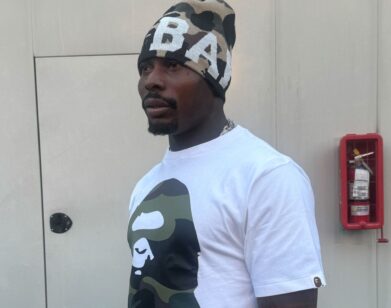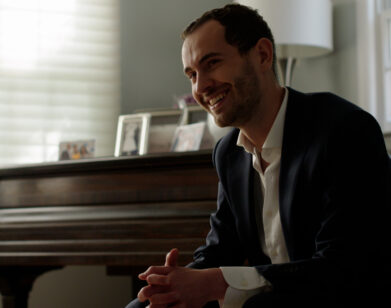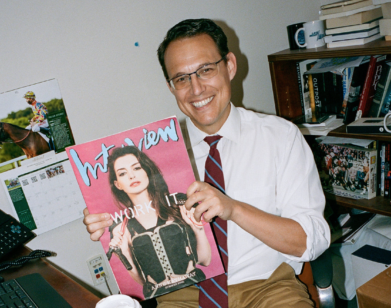ask a sane person
The Poet Terrance Hayes Says Hope, Like Faith, Has Little to Do with Reason

“It is not enough to love you. It is not enough to want you destroyed.” The end of a sonnet is often called “the answer,” and those lines conclude one of the poet Terrance Hayes’s electrifying sonnets about the fraught state of our current Trumpian reality, in his 2018 collection American Sonnets for My Past and Future Assassin. Hayes is a dynamo at capturing the confusion, rage, hope, and beauty of American life as it moves and breathes. His previous poetry books, including the National Book Award–winning Lighthead and How to Be Drawn, suggest that there is no one answer, but ever-shifting possibilities, open, conflicted and endless. Thankfully, Hayes, who is also a visual artist and a professor at New York University, has some hope—or is it faith?—in some kind of American future.
———
INTERVIEW: Where are you and how long have you been isolating?
TERRANCE HAYES: I’ve been in New York City, Greenwich Village, throughout quarantine. It was a great place to be through April and May when the city was quiet and unified by shock, before the George Floyd murder pulled us back into the streets. I was holed up exercising my creative spirit before that, mostly making poems and things to weather the whirlwind.
INTERVIEW: What has this pandemic confirmed or altered about your view of society?
HAYES: That society is as unpredictable as any individual’s life.
INTERVIEW: What is the worst-case scenario for the future?
HAYES: That there will be no future. Short of annihilation and old-fashioned death, I think most things change—things go from bad to inevitably better and then inevitably bad to better again and so on. I see this as an optimistic perspective.
INTERVIEW: What good can come out of this lockdown? Are there any reasons to hope?
HAYES: What good? I can’t say what exactly, but some good can usually be found in most things. A grand good would be a revision of our political system, a reshaping of political parties/philosophies, and a reshaping of politicians. Someone like AOC would not be a threat or exception. Do I think any of that will happen? No. We will proceed as best we can in a system devised several centuries ago by white merchants, landowners, and military men who saw themselves at the center of the universe. A phrase like “reason to hope” is sort of oxymoronic. Hope, like faith, has little to do with “reason.” What’s the opposite of hope? Apathy? Cynicism? Despair? I choose to lean in the direction of hope.
INTERVIEW: What has been your daily routine during this time?
HAYES: I’ve just been working to stay distracted via teaching and reading and writing and scribbling when I’m not zooming around cyber space. I try to fill my head with something other than the noise of 2020. Sometimes I succeed. Sometimes not.
INTERVIEW: Describe the current state of your hair?
HAYES: I’ve been cutting my own hair since I was 15 or so. I’ve cut the hair of my son and his mother’s father and my college roommates and pals, too, over the years. I can truly take my time at it during quarantine.
INTERVIEW: On a scale of 1 to 10, what is your level of panic about the current state of the world?
HAYES: I feel more despair than panic. Panic: 2. Despair: 9. The scales could tip or break after this November.
INTERVIEW: Do you think there is hope for true racial equality in the United States? What do you think is the first step in that goal?
HAYES: There’s lots of evidence that “race is a social construct” is a concept wired to suggest social advantage or disadvantage—usually disadvantage for people of color. Striving for racial equality is equal to striving for socially-constructed equality. Education is at the heart of this sort of equality. The first step would involve truly advocating for a better education system—I mean education in all of its dimensions. College and graduate school and health care should be free for anyone who teaches. We’d get lots of great teachers that way. Or we should have a teaching draft, two years of service after a year of training across the culture. But what do I know? I’m a teacher talking like a teacher.
INTERVIEW: Do you think protests are effective tools for changing the system? How does it make a difference in the long term?
HAYES: Yes, because a true protest is a cry for help. The democratic protest is a request/demand for help correcting a system. The masses may vote, boycott, ridicule, and even riot until the system corrects. It’s like breaking the glass to get the ax you will use to break the door. In the long term, as in the short-term, acts of protest are essential to democracy. The country is founded on an act of protest.
INTERVIEW: How do you personally channel your anger? Do you find anger to be a useful emotion?
HAYES: Anger feels like too simple a notion. I make stuff. I try to fill the time with my own sense of productivity, like working on a single sentence for a month. I think that’s an excellent way to spend spare time these days. And if we’re lucky, the care is worth sharing, but this need not be essential to what you create.
INTERVIEW: What’s the next step after protests in the streets? Where does the righteous rage go?
HAYES: Democracy.
INTERVIEW: What thinker have you taken comfort in of late and why?
HAYES: Russell Brand. Lol, but true.
INTERVIEW: If 2020 were a song, which song would it be?
HAYES: Sometimes “Zombie” by Fela Kuti. Sometimes “Witchcraft” by Fela Kuti. Sometimes “Coffin for Head of State” by Fela Kuti.
INTERVIEW: Where did we go wrong? Like, what was the exact moment?
HAYES: The Negro Act of 1740.
INTERVIEW: If you could stop time at one particular moment in your life, which moment would it be?
HAYES: No particular moment comes to mind. Tonight, I marveled at the diners outdoors listening to bands who set up inside the restaurants to play with the windows open. I’ve stopped time by writing that here.
INTERVIEW: What’s one skill we should all learn while in quarantine?
HAYES: Scrabble.
INTERVIEW: What prevents you from giving up hope in the human race?
HAYES: Humans.
INTERVIEW: Who should be the next president of the United States?
HAYES: This feels like a trick question. It’ll take at least a decade to correct what Trump has corrupted, so the next president will be great if he does little more than slow the cyclone of chaos, distrust, paranoia, and distress.
INTERVIEW: What will happen if Biden gets elected?
HAYES: See previous answer.
INTERVIEW: What will happen if Trump gets re-elected?
HAYES: We will continue fighting.






